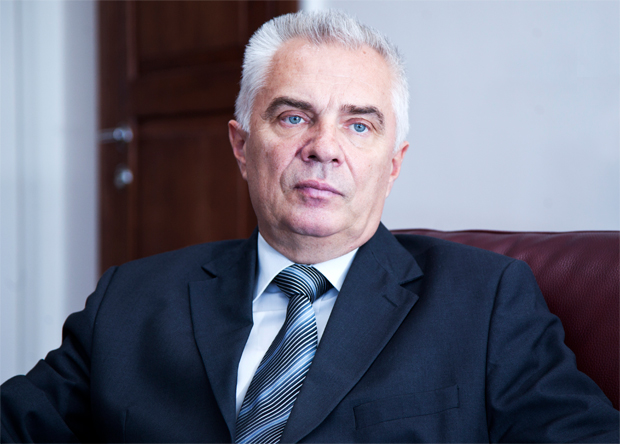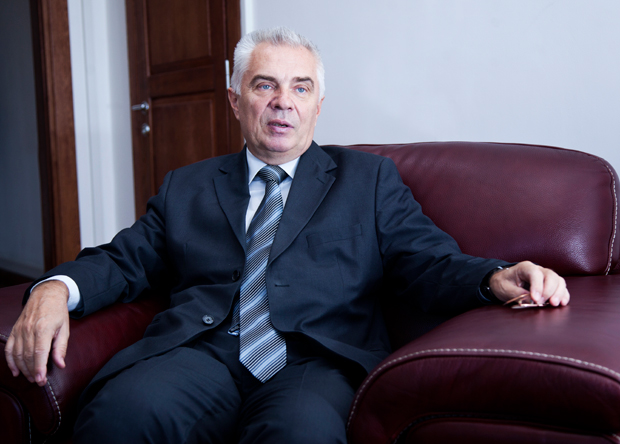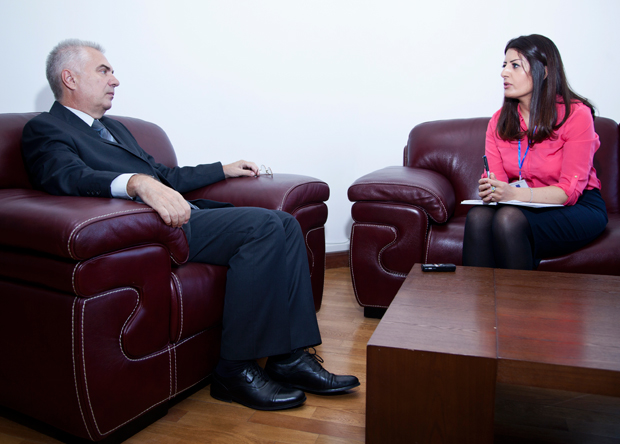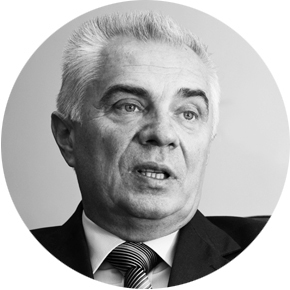Mediamax’s exclusive interview with the Head of the EU Delegation to Armenia, Ambassador Piotr Switalski
- The Foreign Affairs Council has recently granted a mandate on starting talks around a new legal basis for relations with Armenia. When will the talks officially start?
- 16th session of the EU-Armenia Cooperation Committee took place on 4th of November in Yerevan and one of the main topics of discussions was the launching of negotiations on the new overarching agreement between the EU and Armenia. During the meeting between Director for Russia, Eastern Partnership, Central Asia, Regional Cooperation and the OSCE at the European External Action Service (EEAS) Gunnar Wiegand, and the Minister of Foreign Affairs of Armenia Edward Nalbandian both sides confirmed their determination to start the negotiations this year. They discussed possibilities for scheduling a date for opening formal negotiations in December 2015. The scheduling is not easy as December agenda is full of already planned events but I think that the launching the negotiations is possible this year, due to the strong determination from both sides.
How long will the process take? It is difficult to predict. In fact, the negotiations will not start from the scratch. There was a scoping exercise conducted this year to prepare ground for the new agreement and there were concrete discussions to facilitate the start of negotiations. Nevertheless, some parts of the new agreement may be technically challenging. I think that overall, the process will take some months and if everything goes smoothly, if no new problems emerge into the agenda, it would be possible to finalize the negotiations by the end of 2016. However, that would be the most optimistic scenario.
- It’s already known that new Armenia-EU agreement will be based on the formerly negotiated package. Will you clarify what relations are envisaged by the new agreement? How will it be different from the previously negotiated document?
- On the basis of the scoping exercise we can assume that the structure of the new agreement will be based on the Association Agreement negotiated before the Vilnius summit. All the chapters that were planned for Association agreement will be reflected in the new agreement. During the Cooperation Committee, the EU side made a signal that we want the political, the rule of law and justice part of the Association Agreement to be fully incorporated into the new agreement. I think it matches with the position of the Armenian side.
The Political chapter is exactly about cooperation based on common values. The other parts will have to be accommodated to the new situation; I mean Armenia's membership in the Eurasian Economic Union. This particularly relates to the trade chapter.
 Head of the EU Delegation to Armenia Piotr Switalski
Head of the EU Delegation to Armenia Piotr SwitalskiPhoto: Mediamax
The new agreement cannot contain a preferential trade system because Armenia has transferred its competence to set tariffs to the Eurasian Economic Union. However, other parts, including the chapter on sectorial cooperation and economy, will probably preserve much of the substance agreed before. As I said, the trade chapter will have to be adjusted to new realities but we look for rich substance.
EU wants this new agreement to open new chapter in our relations. Therefore, we are aiming for ambitious agreement.
- Armenia and EU bilateral relations have reached another responsible milestone, as earlier was described by the Armenian President. Will the rules of the game be more clarified to avoid possible misunderstanding?
- I think the rules of the game are very clear. Armenia is now in a new format of integration and the new agreement will take into account this new situation. But the EU side made it very clear that the new EU-Armenia agreement cannot be subordinated to Armenia’s obligations stemming from integration within the EEU.
Both sides have positive agenda; both sides want to make relationship tangible and mutually beneficial. In recent context EU considers Armenia an important partner in the European Neighborhood and wants Armenia to modernize its economy and society. EU is the biggest donor, investor, the biggest market for Armenian exports and we want simply to help Armenia to perform better.
- Can we say that after the Ukraine crisis, the EU will now adopt a more pragmatic attitude to relations with the Eastern partners preferring a differentiated approach?
- It has always been the case. The EU never imposed anything on its Eastern partners. The EU is finalizing now the review of the European Neighborhood Policy. It is a very deep and comprehensive review; the EU has consulted with its partners, including with Armenia. Two hallmarks of the review process are the following: the first is differentiation. EU recognizes that its program of cooperation should be better tailored to the needs and choices of each individual partner in the neighborhood, including Armenia.
 Head of the EU Delegation to Armenia Piotr Switalski
Head of the EU Delegation to Armenia Piotr SwitalskiPhoto: Mediamax
The second one is the ownership. We want our partners to be more involved in designing the projects of cooperation to feel themselves as owners of this process. These are two important elements of review of ENP. New ENP will also contain a number of policy sectors which were not present in previous ENP. These new policy areas will include for instance cooperation in security field, which is very important aspect for the South Caucasus.
Generally, ENP has always been based on pragmatic approach. Differentiation approach, which is so prominent now, is reflecting the reality. In the post-Soviet space, recently countries of the region have decided to follow different political and economic paths. Some of them like Ukraine, Moldova, Georgia, decided to move closer to EU. They are pursuing what they call “European path”, and the EU policy has to be more adjusted. They want cooperation to be deeper, closer and bring them close to the EU. Some other countries decided to join Eurasian Economic Union, including Armenia, and EU also has to take due conclusion of it. Some other countries, for instance Azerbaijan, are not ready to join neither EEU nor seek an association with the EU. The EU policy has to take into account sovereign choices of individual states. That’s the logic of the European Neighborhood Policy.
- During his visit to Armenia, President of European Council Donald Tusk noted that it will be possible to embark on the talks on the dialogue around visa liberalization process. What are the developments in this regard?
- We are now in the process of implementation of agreements concerning visa facilitation and readmission. The overall assessment of this process is positive. We are satisfied with the way the EU can cooperate with Armenia on visa facilitation and readmission issues. As you know, Donald Tusk during his visit to Armenia referred to the fact that only after thorough review of the experience gained during the implementation of visa facilitation and readmission agreements we can move to the next stage. But EU is committed to move to the next stage, which is a dialogue on visa liberalization. If everything goes well, we can expect that in 2016 it will be possible to move to exploratory talks on a visa liberalization dialogue.
 Yekaterina Poghosyan talks to Piotr Switalski
Yekaterina Poghosyan talks to Piotr SwitalskiPhoto: Mediamax
It is not a simple process. It puts new obligations on Armenia. These obligations concern broad aspects of rule of law, human rights, including fight against corruption, non-discrimination, etc. If Armenia is ready to embark on this way, which is quite demanding, I think that EU is ready to open this new chapter in 2016, which is very important for Armenians, people with open mind, who want to be able to travel abroad.
We think that it is very important to offer them such possibility. The commitment of the EU is a solid one. Yes, we want to go with Armenia along this way as Mr. Tusk said earlier in Yerevan.
- Constitutional reforms referendum will be held in Armenia on December 6. The authorities claim that the reforms will lead to more effective collaboration of the powers while the opposition states that it paves the way for the “reproduction of power”. How is the constitutional reforms process assessed by the EU?
- It is a sovereign choice of every country to decide which kind of model of political governance suits better its expectations and aspirations, be it presidential, parliamentary system or monarchy. It is up to Armenians to decide what system they want. For us it is important that this new model of governance should be based on long-term vision for this country, state and society. Every constitution is strong if it is based on such a vision.
If constitutional changes serve short-term political objectives, they will never serve their purpose. For us it is important that the process of constitutional changes is fair, inclusive and transparent. Only through transparent and inclusive process the final choice will be respected by all Armenians and help to strengthen Armenia’s determination to improve the state and model of governance and make society more trustful towards the functioning of state. We appreciated the fact that Armenia cooperated very closely with the CoE Venice Commission, which has expressed twice its opinion on the drafts. Discussions with Venice Commission were very candid and very sincere. Now it is the stage for the people to express their view. We would like the constitution process not to slow down other necessary improvements in the functioning of a democratic system in Armenia, in particular, adoption of a new Electoral Code. The comments for the new Electoral Code were made long time ago by the OSCE. We know what should be done and hope it will be done in time. We hope that new elections, planned for next years, will be conducted on the basis of a new electoral code.
Yekaterina Poghosyan talked to Piotr Switalski





















